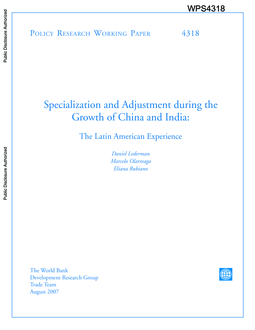Hello! You're looking at a policy document report on Overton
We track government policy, guidelines, think tank research, working papers and more to help our customers see the impact and influence of their work. Are you interested in seeing what information we have to offer? Request a free trial to our platform.
If you fund, produce or manage research or work to influence policy, we'd love to talk. Learn more on our homepage.

Identifiers
handle
10986/7262
Specialization and Adjustment during the Growth of China and India : The Latin American Experience
Rubiano, Eliana, Olarreaga, Marcelo and Lederman, Daniel
This paper examines the extent to which the growth of China and India in world markets is affecting the patterns of trade specialization in Latin American economies. The authors construct Vollrath's measure of revealed comparative advantage by 3-digit ISIC sector, country, and year. This measure accounts for both imports and exports. The empirical analyses explore the correlation between the revealed comparative advantage of Latin America and the two Asian economies. Econometric estimates suggest that the specialization pattern of Latin A-with the exception of Mexico-has been moving in opposite direction of the trade specialization pattern of China and India. Labor-intensive sectors (both unskilled and skilled) probably have been negatively affected by the growing presence of China and India in world markets, while natural resource and scientific knowledge intensive sectors have probably benefited from China and India's growth since 1990.
Topics in this document
Economic growth
Gross domestic product
Economics
China
Trade
Labour economics
Comparative advantage
Mining
Economy of the United States
Market (economics)
Errors and residuals
Regression analysis
Protectionism
Competition
Human activities
Economy
Latin America
United States
Statistics
Factors of production
Correlation and dependence
Export
Demand
Metal
Science
Manufacturing
International economics
Research
Central America
Mexico
Related SDGs
SDG 8: Decent Work and Economic Growth ...
SDG 8: Decent Work and Economic Growth
Target 8.2
Achieve higher levels of economic productivity through diversification, technological upgrading and innovation, including through a focus on high-value added and labour-intensive sectors
Citations
Cited by 3
other policy documents
(1 of them are from other policy sources)
